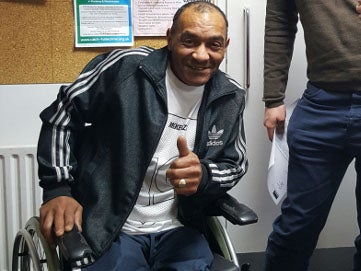Government cut disability benefits of man with no legs 'because he could climb stairs with his arms'
'It doesn’t make sense, because that's the crazy topsy-turvy world that disabled people have to live in,' says law centre chair

Your support helps us to tell the story
From reproductive rights to climate change to Big Tech, The Independent is on the ground when the story is developing. Whether it's investigating the financials of Elon Musk's pro-Trump PAC or producing our latest documentary, 'The A Word', which shines a light on the American women fighting for reproductive rights, we know how important it is to parse out the facts from the messaging.
At such a critical moment in US history, we need reporters on the ground. Your donation allows us to keep sending journalists to speak to both sides of the story.
The Independent is trusted by Americans across the entire political spectrum. And unlike many other quality news outlets, we choose not to lock Americans out of our reporting and analysis with paywalls. We believe quality journalism should be available to everyone, paid for by those who can afford it.
Your support makes all the difference.A double-amputee who was told by the Department for Work and Pensions (DWP) that he was fit to work because he could “climb stairs with his arms”, has won his appeal against the decision and will receive his missing benefits payments.
Julius Holgate, from Hackney, north London, fell into debt and resorted to selling his jewellery and other belongings to survive after he received zero points during his Employment and Support Allowance (ESA) assessment in January.
The DWP said Julius was able to climb stairs using his arms and therefore had “mobility” so he could work.
He later won an appeal against the Government’s decision, after Hackney Community Law Centre intervened on his behalf.
The department has since apologised, claiming the decision was the result of a “clerical error”
Councillor Ian Rathbone, chair of the law centre, told The Independent that problems were caused by third parties handling the assessment process.
"Arms length management means exactly that," he said. "The Government can stand back and say, 'oh it was their fault' when in fact, it’s the their own fault."
He added that the assessment criteria for ESA was so arbitrary that it frequently made bizarre judgements.
“It doesn’t make sense, because that’s the crazy, topsy-turvy world that people [benefits claimants] have to live in,” he said. “Who knows what [Mr Holgate's assessors] were thinking about, but they certainly weren’t looking at a man in a wheelchair.
“They’ve not understood, or bothered to understand. He’s just another number, he’s just another person they want to get off benefits."
Mr Rathbone added that there were many other disability claimants like Mr Holgate, who had been cut off, but didn’t know how to access legal aid.
“It gets hidden, because people get frightened, sometimes they’re able to survive in some form, but people don’t know what to do because they’re just terrified," he said. “There’s an attitude that people shouldn’t be on benefits. That they are “skivers and shirkers’. It’s just disgusting. It’s not British, it’s something else.
Ken Butler, a welfare advice officer from Disability Rights UK, said: “The inaccuracy of work capability assessments is clear from the high number of successful appeals. Almost two-thirds of ESA appeals are revised in the disabled person’s favour.
“We believe that the current testing regime is not fit for purpose in determining the level of financial or work support needed by disabled people.
“It is in urgent need of wholescale reform.”
A DWP spokesman said: “When someone comes in for an assessment they are asked to do a number of actions, and the way the scores were translated caused a clerical error.”
Join our commenting forum
Join thought-provoking conversations, follow other Independent readers and see their replies
Comments